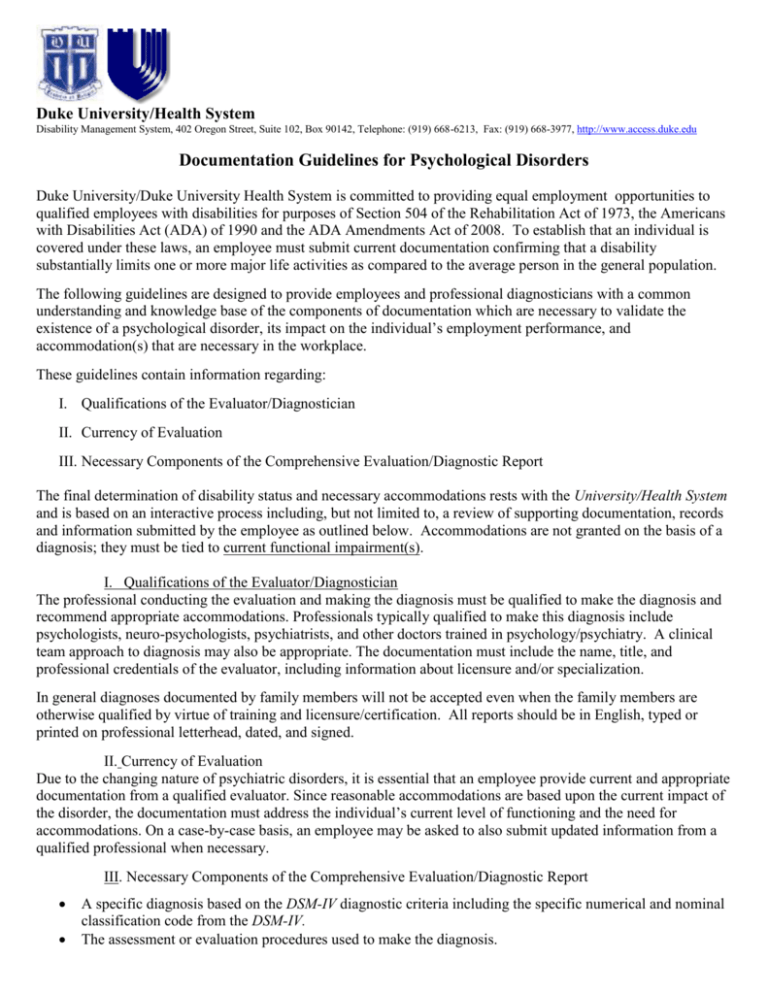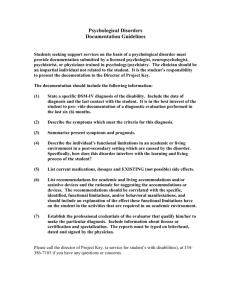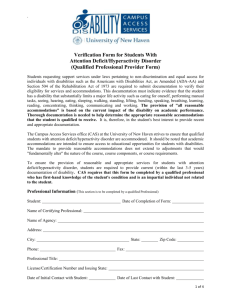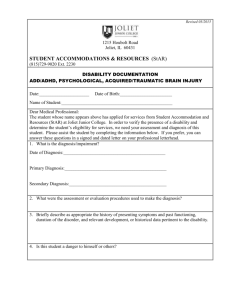Duke University/Health System - Disability Management System
advertisement

Duke University/Health System Disability Management System, 402 Oregon Street, Suite 102, Box 90142, Telephone: (919) 668-6213, Fax: (919) 668-3977, http://www.access.duke.edu Documentation Guidelines for Psychological Disorders Duke University/Duke University Health System is committed to providing equal employment opportunities to qualified employees with disabilities for purposes of Section 504 of the Rehabilitation Act of 1973, the Americans with Disabilities Act (ADA) of 1990 and the ADA Amendments Act of 2008. To establish that an individual is covered under these laws, an employee must submit current documentation confirming that a disability substantially limits one or more major life activities as compared to the average person in the general population. The following guidelines are designed to provide employees and professional diagnosticians with a common understanding and knowledge base of the components of documentation which are necessary to validate the existence of a psychological disorder, its impact on the individual’s employment performance, and accommodation(s) that are necessary in the workplace. These guidelines contain information regarding: I. Qualifications of the Evaluator/Diagnostician II. Currency of Evaluation III. Necessary Components of the Comprehensive Evaluation/Diagnostic Report The final determination of disability status and necessary accommodations rests with the University/Health System and is based on an interactive process including, but not limited to, a review of supporting documentation, records and information submitted by the employee as outlined below. Accommodations are not granted on the basis of a diagnosis; they must be tied to current functional impairment(s). I. Qualifications of the Evaluator/Diagnostician The professional conducting the evaluation and making the diagnosis must be qualified to make the diagnosis and recommend appropriate accommodations. Professionals typically qualified to make this diagnosis include psychologists, neuro-psychologists, psychiatrists, and other doctors trained in psychology/psychiatry. A clinical team approach to diagnosis may also be appropriate. The documentation must include the name, title, and professional credentials of the evaluator, including information about licensure and/or specialization. In general diagnoses documented by family members will not be accepted even when the family members are otherwise qualified by virtue of training and licensure/certification. All reports should be in English, typed or printed on professional letterhead, dated, and signed. II. Currency of Evaluation Due to the changing nature of psychiatric disorders, it is essential that an employee provide current and appropriate documentation from a qualified evaluator. Since reasonable accommodations are based upon the current impact of the disorder, the documentation must address the individual’s current level of functioning and the need for accommodations. On a case-by-case basis, an employee may be asked to also submit updated information from a qualified professional when necessary. III. Necessary Components of the Comprehensive Evaluation/Diagnostic Report A specific diagnosis based on the DSM-IV diagnostic criteria including the specific numerical and nominal classification code from the DSM-IV. The assessment or evaluation procedures used to make the diagnosis. A description of current functional limitations imposed by this disorder. The major symptoms of the disorder currently manifested by the employee, including level of severity. Relevant information regarding medications, including side-effects. When the individual was last seen. A specific request for accommodations with supporting justification for each. Evidence of significant limitation in the employment setting must be provided. 2/10/2009







